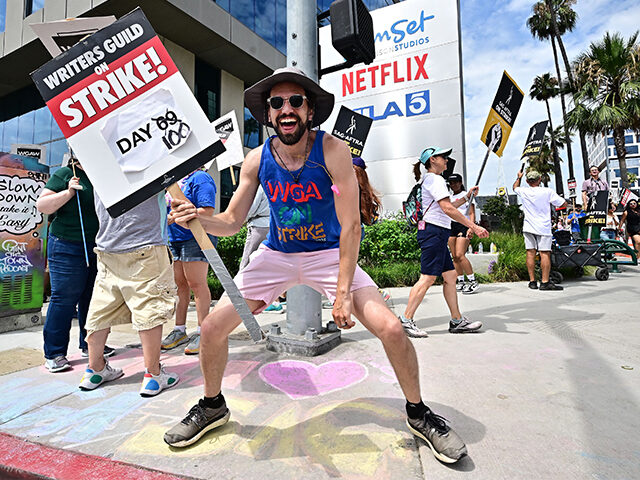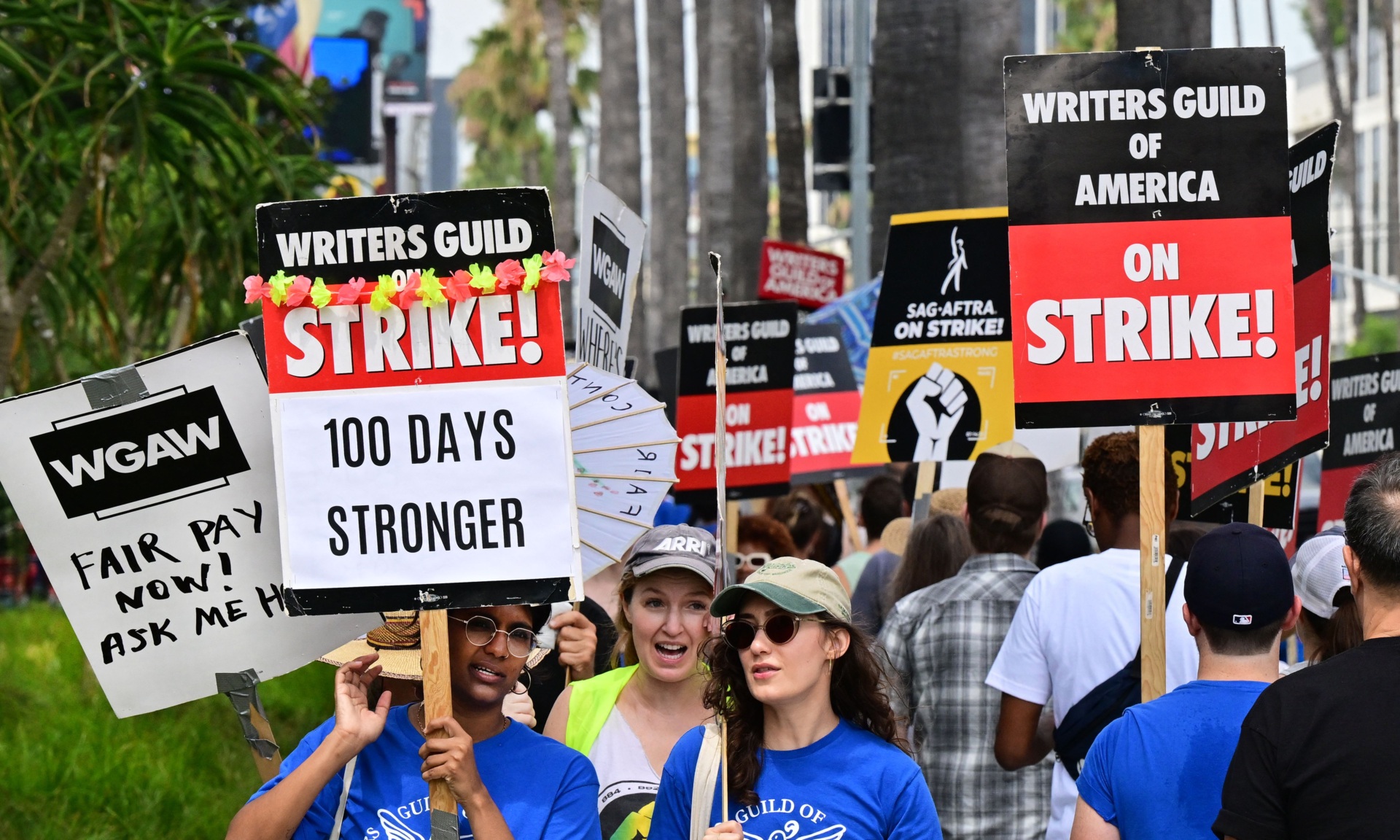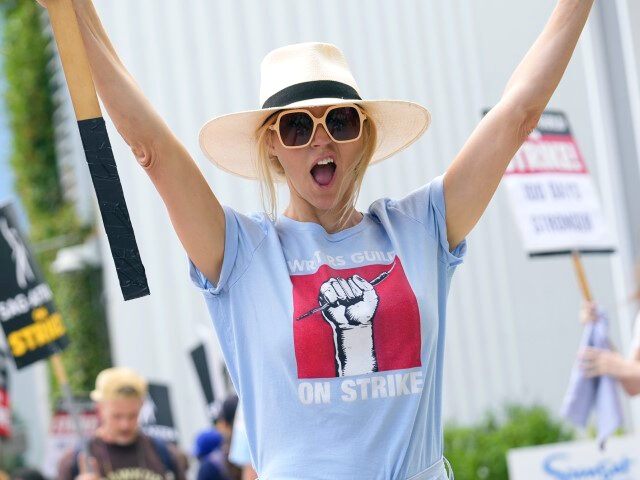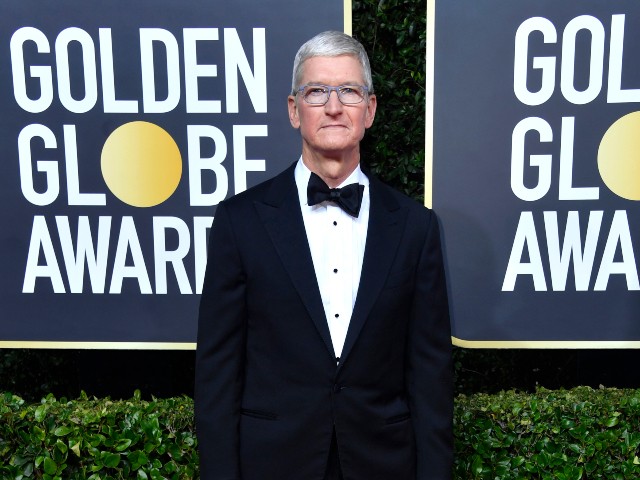IT BEGINS - ACTORS GOING HOMELESS! THE STRIKE IS CAUSING MASSIVE FINANCIAL TRAUMA
Tragic Kingdom: Disney+ Loses 300,000 Domestic Subscribers as Prices Keep Climbing, Flops Pile Up
Hollywood Writers to Resume Negotiations with Studios After 100 Days of Striking

Striking Hollywood workers are set to return to the bargaining table with the major studios and streamers Friday following more than 100 days of picketing that has brought TV and movie production to a standstill around the country.
The resumption of talks follows a nasty, acrimonious sit-down last week that ended with the two sides still miles apart. The Writers Guild of America accused the studios’ negotiating body, the AMPTP, of leaking details of the meeting to the news media and of continuing to stonewall negotiations.
WGA leaders expressed a willingness to try again this week.
“Our committee returns to the bargaining table ready to make a fair deal, knowing the unified WGA membership stands behind us and buoyed by the ongoing support of our union allies,” the guild said in a statement.
The 100-day milestone means the WGA strike has surpassed the last writers strike in 2007 in terms of duration.

Members of the Writers Guild of America (WGA) and the Screen Actors Guild walk the picket line outside of Netflix in Hollywood, California, on August 9, 2023. (FREDERIC J. BROWN/AFP via Getty Images)
It remains unclear when striking actors will sit down again with the studios. The SAG-AFTRA strike began more than two months after writers walked off the job.
The historic double strike has essentially shut down the entertainment industry and wreaked havoc on local economies stretching from California to Georgia that serve the industry.
With no end in sight, writers and actors are doubling down on their demands for better compensation tied to streaming media as well as guarantees that they won’t be replaced by artificial intelligence technology.
But Hollywood executives appear to be playing a game of attrition as strikers burn through their personal savings. They are also aggressively pursuing A.I., with Disney, Netflix, and others ramping up investments in the technology.
Follow David Ng on Twitter @HeyItsDavidNg. Have a tip? Contact me at dng@breitbart.com
100 days of the writers’ strike: What is the way forward?
For 100 days, some 10,000 writers in the Writers Guild of America (WGA) have been engaged in a battle against the giant corporations that dominate the film, internet streaming and television industry. Braving the hottest summer in modern history, striking writers and their supporters have picketed outside studios and corporate offices in Los Angeles, New York and Chicago, while their co-workers in Australia and the United Kingdom have held rallies in support.
The current strike is now the second longest in the history of the WGA, surpassing the 2007-2008 strike. As was the case in that strike 15 years ago, the studio executives, with billions in assets at their disposal, are more than willing to “bleed out” writers until they “start losing their apartments and losing their houses,” as one executive put it.
The writers were joined one month ago by 65,000 actors, beginning the first “dual strike” by the two sections of workers since 1960. The combined strike of some 76,000 writers and actors is the largest strike in Hollywood film and television history. It could be much larger given that only a fraction of the 161,000-strong SAG-AFTRA membership is currently on strike.
As the strike has gone on and the corporations have dug in their heels, actors and writers have made statements pointing to the broader issues involved.
“It used to be kings and queens and emperors, and now it’s captains of industry,” Alan Ruck of Succession said earlier this week. “And they think that the world and everything on it and in it, everything in the air and the ocean belongs to them.” At a July 25 rally in New York, fellow Succession star Arian Moayed drew a direct comparison between the fascistic Roy family in the show and the current studio executives. “We deserve to work together to make beautiful art so people can enjoy it. It’s like these people haven’t seen f***ing Succession. It’s about you!”
Leila, a striking actress, told World Socialist Web Site reporters last month, “I’m glad we’re joining what other workers are going through right now. Hotel workers, nurses. ... I think we need a general strike in this country. We absolutely need to withhold our labor.”
These statements, and there are many more like them, express a broader sentiment, but it is necessary to draw out the implications.
First, writers and actors are engaged in a class struggle, which is pitting them not only against the gigantic media corporations, but behind them the banks and Wall Street, which are demanding an enormous escalation in the exploitation of workers everywhere. A fight against these “captains of industry” and modern-day “kings and queens and emperors” must be waged as a class fight, mobilizing the full strength of the working class.
Indeed, the actors’ and writers’ strike is part of a developing class movement in the US and throughout the world. According to Bureau of Labor Statistics data, cited by Politico this week, more than “200,000 workers at large companies participated in work stoppages last month, easily topping the 126,500 that were involved in strikes in the entirety of 2022.”
The soaring cost of living, one of the consequences of escalating war and the bailout of the rich, has sparked social unrest throughout the world this year, from the protests of millions in France, to the strikes of hundreds of thousands in the UK, the strike of dockworkers in Canada and mass protests in Sri Lanka against austerity.
What is blocking the development of these struggles into a united movement of the working class is the trade union apparatus, controlled by individuals in the top 5 or even top 1 percent of the population, which functions as an instrument of isolation and suppression.
In the initial weeks of the strike, many writers and actors were enthusiastic about the prospect of a joint struggle with 340,000 UPS workers, which would have enormously strengthened both sections of the working class. The Teamsters apparatus, however, after first blocking a strike at Yellow Freight that paved the way for the company’s bankruptcy, announced a last-minute sellout contract on July 25, which it is currently trying to get workers to approve.
On the West Coast, over 22,000 dockworkers have been without a contract for over 13 months. Yet the International Longshore and Warehouse Union (ILWU) has yet to hold a strike authorization vote as it conspires behind the scenes to try to get passed an agreement that no worker has seen. Earlier, the ILWU scabbed on the Canadian dockworkers’ strike by accepting cargo ships that were diverted to ports in Seattle and San Francisco.
As for WGA and SAG-AFTRA, they have counseled strikers to direct their support to strike-breaking Democratic politicians. The leadership of SAG-AFTRA only called a strike of the actors after a semi-revolt from the membership, in the form of an open letter warning the union officials not to sell out their struggle.
After the strike began, without a single discussion, much less a vote among the membership, the SAG-AFTRA bureaucracy agreed to allow non-Alliance of Motion Picture and Television Producers studios to apply for “interim agreements.” These agreements have provoked an outpouring of anger among striking workers, who rightly see them as a stab in the back.
This brings us to the second point: Every class struggle, as Marx and Engels put it in the Communist Manifesto, is a political struggle. That is, it inevitably raises, in the course of its development, the question of power. Who controls society? And in whose interests?
If the ruling class owns everything—perhaps not yet all the oceans and the air—then it is a question of reorganizing society on entirely different lines, where the productive forces of society are not owned by a tiny fraction of the population but are controlled democratically, on the basis of social need. That is, it is necessary to replace capitalism with socialism.
Writers and actors, along with the working class as a whole, must confront the fact that the entire political establishment exists to represent one class in the class struggle, namely, the capitalist class. While the Republican Party plumbs the depths of fascism, the Democrats, no less a party of Wall Street, are focused entirely on the escalation of war, now against Russia and soon against China.
Both parties are united in their determination to make the working class pay for the crisis of capitalism, though the Democrats prefer to utilize the services of the union apparatus to assist in the process.
The imperative for a socialist reorganization of economic life is inextricably connected to the future of cultural production itself. If the ruling class has its way, and it is determined to do so, the population will have no art to “enjoy” but propaganda and pablum. The fight to defend serious artistic work must be infused with and connected to the development of a working class movement against capitalism.
From these points flow two conclusions. First, it is imperative that the strike by writers and actors break free from the constraints imposed upon it by the trade union apparatus. The WSWS urges television and film workers to form a rank-and-file committee, as part of the International Workers Alliance of Rank-and-File Committees (IWA-RFC). An urgent appeal must be directed to every section of the working class for a united fight, independent of and in opposition to the trade union apparatus.
Second, this must be connected to a political struggle against the entire state apparatus of the ruling elites and the social system it defends, capitalism. To think that this is possible outside of a mass, revolutionary movement of the working class is the most unrealistic form of utopianism. The modern “kings and queens and emperors” will no more willingly give up their wealth and privileges than their predecessors.
WGA Protests Outlast 2007-2008 Writers’ Strike, Which Ended After 100 Days

NEW YORK (AP) — TV late-night comedy scribe Greg Iwinski, 38, was still only an aspiring writer when Hollywood writers held their landmark strike in 2007-2008.
But as he manned the picket lines Wednesday — the day the current strike hit its 100th day, matching the length of the previous one — he was keenly aware of all the history involved.
“I got a residual check yesterday for a show I worked on, because people went on strike in 1960, before I was even born,” he said. “And so knowing that we could be doing that for people 60 years from now is incredibly motivating.”
And yes, said Iwinski, who has written for “The Late Show with Stephen Colbert,” “Last Week Tonight with John Oliver,” and other shows, 100 days is a long time — but he is prepared to strike as long as it takes.
“Today is our 100th day of striking and we’re striking for the same thing we were on Day One, which is a fair contract,” he said. “We have the same two pages of proposals and the studios have not yet responded to all those proposals … so I guess until that happens, we’ll still be out here.”
Wednesday’s milestone comes as the U.S. film and television industries remain paralyzed by dual strikes by its actors and screenwriters. There’s no foreseeable end — a negotiating session last week involving Hollywood studios and streamers and the striking writers ended with little progress. Television networks are a month away from starting a new fall season, and broadcasters have already put contingency plans in place for programming that excludes their most popular scripted series.
Hollywood’s actors began their strike July 14, creating the first dual strike since 1960. Issues at play for both unions include the use of artificial intelligence and residuals related to streaming.
The Writers Guild of America held special pickets marking the 100th day in both New York and Los Angeles. Outside the Netflix offices on Broadway in Manhattan, the scene had an upbeat feel. A steady stream of protesters — both writers and their actor allies in SAG-AFTRA — danced, pounded on drums and chanted slogans as they marched around the city block.
Befitting writers, signs were markedly creative: “This Barbie is striking!!!” “Not Kenough.” “The only free writing you deserve is this sign.” “Writers make people happy (and sad).” And the simple: “No wages, no pages.”
Nicole Conlan, a striking comedy writer for “The Daily Show,” said that despite being on strike since May 2, she’s been so busy organizing on the picket lines that “I woke up today, the 100th day, and it feels like we’ve just started.”
“We don’t want to be out of work,” said Conlan, 33, “but the mood is very high because we still have all this support after 100 days. Compared to previous strikes, it really feels like people understand what we’re doing and people still are really throwing their support behind us.”
“The things that we’re fighting for apply not just to the industry but to the entire economy,” Conlan said. “In every industry people can see Wall Street and tech finding a way to make careers into gig jobs — so even though we do a very weird kind of job, writing, it’s easy for the layperson to see our jobs becoming gig jobs, and to see how that applies to their job as a nurse, or as a flight attendant, or as a construction worker.”
Vicki Winters, a standup comic who was picketing alongside the writers, played the drums as her colleagues marched. “Corporate greed has got to go,” said Winters, 66. “They are taking advantage of the workers of the Screen Actors Guild, the Writers Guild, pretty much every worker that’s at the ground level … while billionaires, millionaires choose a number they pull out of the air, like ‘I’m going to pay myself $11 million,’ and meanwhile the guy downstairs is going to make $7.25 an hour.”
Lawsuit: Apple and Tetris Company Stole Plot for Film About Iconic Video Game from Author’s Book

Apple and The Tetris Company are facing a lawsuit filed by author Dan Ackerman, who accuses them of adapting his 2016 book The Tetris Effect: The Game That Hypnotized the World into a film without his permission. The lawsuit, which identifies 22 “similarities” between the book and the movie Tetris which released earlier this year, requests damages of six percent of the film’s $80 million production budget, equal to $4.8 million.
Business Insider reports that author Dan Ackerman has launched a lawsuit against Apple and The Tetris Company, accusing them of turning his 2016 book The Tetris Effect: The Game That Hypnotized the World into a film without his authorization. The complaint seeks $4.8 million in damages, or 6 percent of the film’s $80 million production costs.
According to the lawsuit, Ackerman’s book, which explores the cultural impact of the iconic video game, was used as the basis for the film Tetris. The author claims that the film utilizes “the same characters, plot, and underlying themes as his 2016 book.”
The lawsuit details 22 similarities between the book and the film, including a “narrative invention” where Tetris distributor Henk Rogers’ guide “turned out to be a KGB agent.” Other similarities include a conversation in the film that is said to be “lifted from Ackerman’s interview with the game’s creator, Alexey Pajitnov,” and a scene showing the deal where “Tetris was paired with Game Boy was ‘paraphrased’ from Ackerman’s retelling.”
The legal action also reveals that Ackerman’s representatives sent his book to The Tetris Company’s PR firm, which was then allegedly given to Tetris CEO Maya Rogers and used to create the film’s screenplay. In a further twist, the lawsuit mentions that Tetris sent Ackerman’s agent “a strongly worded Cease and Desist letter” threatening legal action while refusing to license the video game’s intellectual property.
The lawsuit emphasizes a similar focus in both the book and the film on “Cold War intrigue and placing an outsized role on the Russian government organization ELORG.”
As of now, Apple and The Tetris Company have not responded to requests for comment on the lawsuit.
Read more at Business Insider here.
Lucas Nolan is a reporter for Breitbart News covering issues of free speech and online censorship. Follow him on Twitter @LucasNolan
Tragic Kingdom: Disney+ Loses 300,000 Domestic Subscribers as Prices Keep Climbing, Flops Pile Up

The Disney+ streaming service lost 300,000 subscribers in the United States and Canada in the most recent quarter — an ominous sign for the studio as it continues to pour billions of dollars into new streaming content that is flopping with viewers.
To make matters worse for its fans, the Walt Disney Company is hiking Disney+’s monthly subscription price to $13.99 from $10.99 — a 27 percent increase. Last year, the price rose to $10.99 from $7.99, which means Disney+ subscribers will see their monthly bill climb a total of 75 percent in less than two years.
The new price is set to take effect in October.
On Wednesday, the studio reported domestic Disney+ subscriptions fell by 300,000 for the fiscal third quarter, to 46 million subscribers. By comparison, Netflix boasts around 76 million domestic subscribers. Worldwide, Disney+ subscriptions declined 24 percent for the period, mostly due to the end of Disney’s deal with Hotstar in India.
The domestic subscriber decline signals rough waters ahead for Disney as U.S. numbers have been stagnating for the past few quarters, indicating that the domestic market has likely reached its peak less than three years after the platform launched in 2019.
Disney continues to spend billions of dollars on new streaming content that receives a tremendous amount of hype but often ends up flopping with viewers.
Recent flops include Willow, which was canceled after just one season and then removed completely from the platform. National Treasure: Edge of History, which was also nixed after one season.
The highly touted Marvel series Secret Invasion managed to draw just 994,000 U.S. households in its first five days of release, making it the second-lowest rated Marvel series after the feminist Ms. Marvel, which drew 775,000 households over a similar period.
Low-level viewer enthusiasm is emerging as a major problem for Disney+.
The streamer has been having a hard time getting subscribers to watch its original Marvel and Star Wars series, with a Nielsen study showed that not a single Marvel or Star Wars show cracked the top 15 most-watched streaming series for 2022.
The only Disney+ show that made the top 15 was The Simpsons.
Follow David Ng on Twitter @HeyItsDavidNg. Have a tip? Contact me at dng@breitbart.com

No comments:
Post a Comment